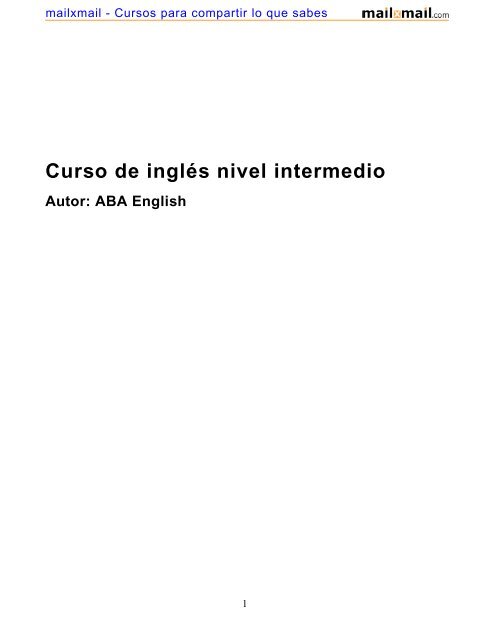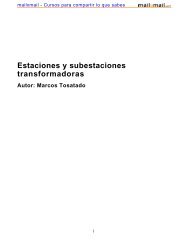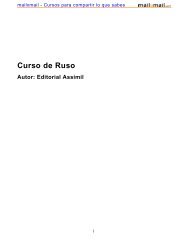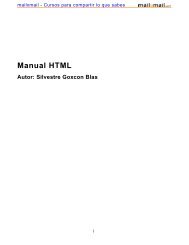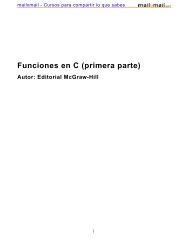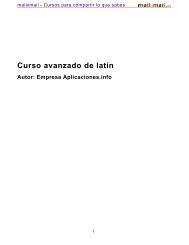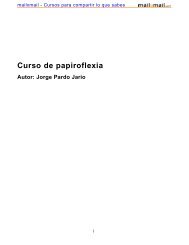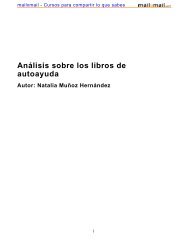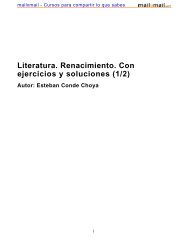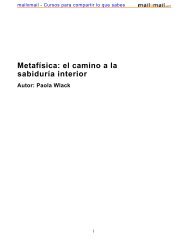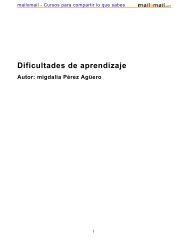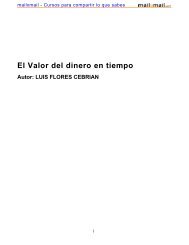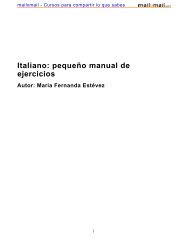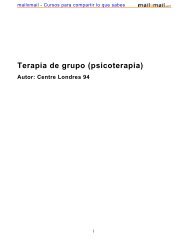Curso de inglés nivel intermedio Autor: ABA English - MailxMail
Curso de inglés nivel intermedio Autor: ABA English - MailxMail
Curso de inglés nivel intermedio Autor: ABA English - MailxMail
Create successful ePaper yourself
Turn your PDF publications into a flip-book with our unique Google optimized e-Paper software.
mailxmail - <strong>Curso</strong>s para compartir lo que sabes<br />
<strong>Curso</strong> <strong>de</strong> inglés <strong>nivel</strong> <strong>intermedio</strong><br />
<strong>Autor</strong>: <strong>ABA</strong> <strong>English</strong><br />
1
mailxmail - <strong>Curso</strong>s para compartir lo que sabes<br />
Presentación <strong>de</strong>l curso<br />
Este es el segundo curso que publica <strong>ABA</strong> <strong>English</strong> <strong>de</strong> forma gratuita para mailxmail.<br />
Este curso contiene 24 capítulos en los que podrás continuar con tu aprendizaje <strong>de</strong>l<br />
inglés. Con él apren<strong>de</strong>rás a conjugar los verbos modales, frases condicionales,<br />
instruirte sobre el presente simple, verbos irregulares y muchos otros conceptos que<br />
te servirán para seguir con tu aprendizaje <strong>de</strong> inglés. Recuerda que pue<strong>de</strong>s encontrar<br />
este contenido y muchos ejercicios más, en modo multimedia para que puedas<br />
reproducir y grabar en inglés en www.abaenglish.com<br />
2
mailxmail - <strong>Curso</strong>s para compartir lo que sabes<br />
1. Apren<strong>de</strong>r a conjugar los verbos modales<br />
1 Los verbos modales<br />
1.1 Los verbos modales son los siguientes:<br />
can saber, po<strong>de</strong>r, ser capaz <strong>de</strong><br />
could podría ...<br />
may po<strong>de</strong>r<br />
might podría ...<br />
must <strong>de</strong>ber<br />
will No hay traducción. Cuando acompaña a otro verbo lo convierte<br />
en futuro: I will go - Yo iré.<br />
shall Se utiliza para sugerir cosas u ofrecer ayuda.<br />
would No hay traducción. Cuando acompaña a otro verbo lo convierte<br />
en condicional: I would go - Yo iría.<br />
should <strong>de</strong>bería ...<br />
ought to <strong>de</strong>bería ...<br />
Un verbo modal tiene características especiales. Veámoslas poniendo como ejemplo<br />
el verbo can.<br />
1. no existe en la forma infinitive con to. Es <strong>de</strong>cir, no se pue<strong>de</strong> <strong>de</strong>cir "to can".<br />
2. siempre tiene la misma forma. Es invariable, es <strong>de</strong>cir, no existe "cans" ni<br />
"canning".<br />
3. va <strong>de</strong>lante <strong>de</strong> otro verbo sin la preposición to entre ambos.<br />
Ejemplo: I can ski y nunca "I can to ski".<br />
4. no precisa el verbo auxiliar to do para hacer preguntas y negaciones.<br />
Ejemplo: Can you ...? y nunca "Do you can ...?"<br />
I can't ... y nunca "I don't can ..."<br />
1.2 Veamos algunos ejemplos <strong>de</strong> verbos modales:<br />
I can swim but I can't dive very well<br />
Sé nadar pero no sé bucear muy bien<br />
My brother could speak when he was 12 months old<br />
Mi hermano sabía hablar cuando tenía 12 meses<br />
We may go to Italy for our holidays next year<br />
Po<strong>de</strong>mos ir a Italia en vacaciones el año que viene<br />
We might even go to China if we have enough money<br />
Podríamos incluso ir a China si tuviéramos suficiente dinero<br />
You must see the latest film by Stallone. It's incredible!<br />
Debes ver la última película <strong>de</strong> Stallone. ¡Es increíble!<br />
They will <strong>de</strong>ci<strong>de</strong> after the meeting<br />
Ellos <strong>de</strong>cidirán <strong>de</strong>spués <strong>de</strong> la reunión<br />
3
mailxmail - <strong>Curso</strong>s para compartir lo que sabes<br />
Shall we go now?<br />
¿Vamos ahora?<br />
He would come if he wasn't studying<br />
Él vendría si no estuviera estudiando<br />
We should send her some flowers on her birthday<br />
Nosotros <strong>de</strong>beríamos enviarle flores por su cumpleaños<br />
They ought to pay you extra money for this work<br />
Ellos <strong>de</strong>berían pagarte dinero extra por este trabajo<br />
En las próximas unida<strong>de</strong>s veremos con <strong>de</strong>talle estos verbos modales.<br />
4
mailxmail - <strong>Curso</strong>s para compartir lo que sabes<br />
2. Apren<strong>de</strong>r a conjugar el verbo Can<br />
1. El primer verbo modal que veremos es can - saber, po<strong>de</strong>r.<br />
1.1 Ejemplos <strong>de</strong> este verbo con el significado <strong>de</strong> "saber"<br />
I can ski Yo sé esquiar<br />
You can swim very well Tú sabes nadar muy bien<br />
He can draw anything Él sabe dibujar cualquier cosa<br />
She can type very fast Ella sabe escribir a máquina muy rápido<br />
We can sing and dance Nosotros sabemos cantar y bailar<br />
They can drive Ellos saben conducir<br />
1.2 Ejemplos <strong>de</strong> este verbo con el significado <strong>de</strong> "po<strong>de</strong>r"<br />
I can come to the party on Friday<br />
Puedo venir a la fiesta el viernes<br />
You can help me if you want<br />
Pue<strong>de</strong>s ayudarme si quieres<br />
He can do the shopping for you<br />
Él pue<strong>de</strong> hacer la compra por ti<br />
She can cook dinner tonight<br />
Ella pue<strong>de</strong> preparar la cena esta noche<br />
We can clean the flat tomorrow<br />
Po<strong>de</strong>mos limpiar el piso mañana<br />
They can take the car if it's raining<br />
Pue<strong>de</strong>n llevarse el coche si llueve<br />
Como ves, en la tercera persona <strong>de</strong>l singular no se aña<strong>de</strong> una -s.<br />
2. El negativo <strong>de</strong> I can - I can't<br />
Las frases negativas con can se forman, o bien, poniendo not <strong>de</strong>trás <strong>de</strong>l verbo,<br />
formando una sola palabra, o suprimiendo una -n y poniendo un apóstrofo en lugar<br />
<strong>de</strong> la -o. Y como dijimos anteriormente no usamos el verbo auxiliar to do. Es <strong>de</strong>cir:<br />
can - cannot - can't<br />
Debes tener especial cuidado con la pronunciación <strong>de</strong> las dos formas can y can't. Si<br />
no pronuncias bien la "t" final <strong>de</strong> la negación se pue<strong>de</strong>n confundir la forma<br />
afirmativa y la forma negativa. Hay un truco para diferenciar ambas formas:<br />
alargamos la vocal "a" en la negación.<br />
I can ski I can't ski<br />
En la primera, la a suena como una "e" corta - I can ski ("ai ken ski"),<br />
y en la segunda, la a suena como una doble "a" - I can't ski ("ai kaant ski").<br />
5
mailxmail - <strong>Curso</strong>s para compartir lo que sabes<br />
Vamos a repetir los ejemplos <strong>de</strong>l punto anterior pero en negativo. Fíjate bien en la<br />
pronunciación.<br />
2.1 Ejemplos con la traducción "saber"<br />
I can't ski Yo no sé esquiar<br />
You can't swim very well Tú no sabes nadar muy bien<br />
He can't draw anything Él no sabe dibujar nada<br />
She can't type very fast Ella no sabe escribir a máquina muy rápido<br />
We can't sing and dance Nosotros no sabemos cantar ni bailar<br />
They can't drive Ellos no saben conducir<br />
2.2 Ejemplos con la traducción "po<strong>de</strong>r"<br />
I can't come to the party on Friday<br />
No puedo venir a la fiesta el viernes<br />
You can't help me. I'm sorry<br />
No pue<strong>de</strong>s ayudarme. Lo siento.<br />
He can't do the shopping for you<br />
Él no pue<strong>de</strong> hacer las compras por ti<br />
She can't cook dinner tonight<br />
Ella no pue<strong>de</strong> preparar la cena esta noche<br />
We can't clean the flat tomorrow<br />
No po<strong>de</strong>mos limpiar el piso mañana<br />
They can't take the car if it's raining<br />
No pue<strong>de</strong>n llevarse el coche si llueve<br />
Veamos ahora ambas formas, afirmativa y negativa en una misma frase:<br />
I can sing but I can't dance<br />
Sé cantar pero no sé bailar<br />
You can look but you can't touch<br />
Pue<strong>de</strong>s mirar pero no pue<strong>de</strong>s tocar<br />
He can read <strong>English</strong> but he can't speak it very well<br />
Él sabe leer inglés pero no sabe hablarlo muy bien<br />
She can use a typewriter but she can't use a PC<br />
Ella sabe usar una máquina <strong>de</strong> escribir pero no sabe usar un PC<br />
We can come on Friday but we can't come on Saturday<br />
Po<strong>de</strong>mos venir el viernes pero no po<strong>de</strong>mos venir el sábado<br />
They can bring their children but they can't bring their dogs<br />
Pue<strong>de</strong>n traer a sus hijos pero no pue<strong>de</strong>n traer a sus perros<br />
Now you can use "can"<br />
Ahora ya sabes usar "can"<br />
6
mailxmail - <strong>Curso</strong>s para compartir lo que sabes<br />
7
mailxmail - <strong>Curso</strong>s para compartir lo que sabes<br />
3. Las preguntas con can<br />
1. Las preguntas con CAN<br />
Como hemos dicho, para formar preguntas con los verbos modales no tenemos que<br />
utilizar el auxiliar to do. Haremos lo mismo que con el verbo to be; cambiar el<br />
or<strong>de</strong>n <strong>de</strong>l sujeto y <strong>de</strong>l verbo, poniendo primero el verbo.<br />
You can dance Can you dance?<br />
Tú sabes bailar ¿Sabes bailar?<br />
Como ya vimos en la unidad 50, el verbo can tiene dos significados: "po<strong>de</strong>r" y<br />
"saber".<br />
1.1 Ejemplos con la traducción "saber":<br />
Can you play the piano? ¿Sabes tocar el piano?<br />
Can he speak <strong>English</strong>? ¿Él sabe hablar inglés?<br />
Can she cook and sew? ¿Ella sabe cocinar y coser?<br />
Can you play chess? ¿Sabéis jugar al ajedrez?<br />
Can they drive? ¿Saben conducir?<br />
1.2 Ejemplos con la traducción "po<strong>de</strong>r":<br />
Can you come to my birthday party?<br />
¿Pue<strong>de</strong>s venir a mi fiesta <strong>de</strong> cumpleaños?<br />
Can he see me?<br />
¿Pue<strong>de</strong> verme él?<br />
Can she attend the meeting?<br />
¿Pue<strong>de</strong> ella asistir a la reunión?<br />
Can we afford to go on holiday?<br />
¿Po<strong>de</strong>mos permitirnos ir <strong>de</strong> vacaciones?<br />
Can you sleep with so much noise?<br />
¿Podéis dormir con tanto ruido?<br />
Can they look after* the children for us?<br />
¿Pue<strong>de</strong>n ocuparse <strong>de</strong> los niños por nosotros?<br />
* to look = mirar, to look after = cuidar <strong>de</strong>, ocuparse <strong>de</strong><br />
1.3 Respuestas afirmativas y negativas abreviadas con el verbo modal can.<br />
Can you type? Yes, I can<br />
¿Sabes escribir a máquina? Sí, yo sé<br />
Can he dance? Yes, he can<br />
¿Sabe él bailar? Sí, él sabe<br />
Can she swim? Yes, she can<br />
¿Sabe ella nadar? Sí, ella sabe<br />
8
mailxmail - <strong>Curso</strong>s para compartir lo que sabes<br />
Can you drive? Yes, we can<br />
¿Sabéis conducir? Sí, nosotros sabemos<br />
Can they speak <strong>English</strong>? Yes, they can<br />
¿Saben ellos hablar inglés? Sí, ellos saben<br />
Can you ski? No, I can't<br />
¿Sabes esquiar? No, yo no sé<br />
Can he play the guitar? No, he can't<br />
¿Sabe él tocar la guitarra? No, no sabe<br />
Can she play tennis? No, she can't<br />
¿Sabe ella jugar a tenis? No, no sabe<br />
Can you cook? No, we can't<br />
¿Sabéis cocinar? No, no sabemos<br />
Can they speak French? No, they can't<br />
¿Saben ellos hablar francés? No, no saben<br />
2. Peticiones con can<br />
2.1 Ejemplos <strong>de</strong> peticiones con can<br />
Can you help me with my homework?<br />
¿Pue<strong>de</strong>s ayudarme con mis <strong>de</strong>beres?<br />
Can he change a five-pound note?*<br />
¿Pue<strong>de</strong> él cambiar un billete <strong>de</strong> cinco libras?<br />
Can she teach my daughter to dance?<br />
¿Pue<strong>de</strong> ella enseñar a bailar a mi hija?<br />
Can you give me a hand?<br />
¿Podéis echarme una mano?<br />
* En inglés americano billete es bill y en inglés británico es note.<br />
Ejemplo: a five-dollar bill - un billete <strong>de</strong> cinco dólares.<br />
Can they change the meeting to Monday?<br />
¿Pue<strong>de</strong>n cambiar la reunión al lunes?<br />
2.2 Posibles respuestas a peticiones con can<br />
Can you help me? Yes. Of course<br />
¿Pue<strong>de</strong>s ayudarme? Sí. Por supuesto.<br />
Can you come and look at this? Yes. OK. Just a minute<br />
¿Pue<strong>de</strong>s venir y mirar esto? Sí. Vale. Un momento.<br />
Can you lend me five pounds? I'm sorry. I'm broke, too<br />
¿Pue<strong>de</strong>s prestarme cinco libras? Lo siento. Estoy también sin blanca.<br />
3. Pedir permiso con can<br />
3.1 Ejemplos<br />
Can I come in? ¿Puedo pasar? - ¿Puedo entrar?<br />
9
mailxmail - <strong>Curso</strong>s para compartir lo que sabes<br />
Can he smoke? ¿Pue<strong>de</strong> él fumar?<br />
Can she open the window? ¿Pue<strong>de</strong> ella abrir la ventana?<br />
Can we start the meeting now? ¿Po<strong>de</strong>mos empezar la reunión ahora?<br />
Can they come too? ¿Pue<strong>de</strong>n venir ellos también?<br />
Como estamos pidiendo permiso, las respuestas pue<strong>de</strong>n ser las anteriores: OK, Of<br />
course, I'm sorry, etc.<br />
10
mailxmail - <strong>Curso</strong>s para compartir lo que sabes<br />
4. Peticiones formales - Could you ...?, Could I ...?,<br />
May I ...?<br />
1. Peticiones formales<br />
Para solicitar o conce<strong>de</strong>r permiso hemos visto que se pue<strong>de</strong> emplear can.<br />
Can I ask you a question? Yes, of course you can<br />
¿Puedo hacerte una pregunta? Sí, por supuesto que pue<strong>de</strong>s<br />
You can go home now, if you like<br />
Pue<strong>de</strong>s marcharte a casa ahora, si lo <strong>de</strong>seas<br />
Can es la forma más usada, pero en un estilo más formal se utiliza el condicional<br />
could - podría, en vez <strong>de</strong> can - puedo. También hay otro verbo modal may - puedo,<br />
que se usa para hacer peticiones o conce<strong>de</strong>r permiso en un estilo más formal.<br />
Could I ask you a question, if you are not too busy?<br />
¿Podría hacerte una pregunta, si no estás <strong>de</strong>masiado ocupado?<br />
You may go home now, if you like<br />
Pue<strong>de</strong> marcharse a casa ahora, si lo <strong>de</strong>sea<br />
Veamos un ejemplo:<br />
Can I come in? - uso informal<br />
Could I come in? o May I come in? - uso formal<br />
Para pedir ayuda también utilizamos can y could pero no may.<br />
Can you help me? Could you help me?<br />
¿Pue<strong>de</strong>s ayudarme? ¿Podrías ayudarme?<br />
Veamos algunos ejemplos más:<br />
Can you give me a hand? Yes, all right<br />
¿Pue<strong>de</strong>s echarme una mano? Sí, <strong>de</strong> acuerdo<br />
Could you lend me five pounds? Yes, of course<br />
¿Podrías prestarme cinco libras? Sí, por supuesto<br />
Could you help me, please? I'm sorry, I'm a bit busy<br />
¿Me podría ayudar, por favor? Lo siento, estoy ocupado<br />
May I use your phone? Sure. Go ahead<br />
¿Puedo usar su teléfono? Por supuesto. A<strong>de</strong>lante.<br />
11
mailxmail - <strong>Curso</strong>s para compartir lo que sabes<br />
5. Ofrecimientos con verbos modales<br />
1. Ofrecimientos con verbos modales<br />
La forma más fácil <strong>de</strong> ofrecer un servicio, como en español, es usar el verbo<br />
can - en la pregunta: Can I ...?<br />
Can I get you anything? ¿Puedo traerle algo?<br />
Can I be of service? ¿Puedo ayudarle?<br />
Can I help you? ¿Puedo ayudarle?<br />
La primera cosa que un <strong>de</strong>pendiente en una tienda inglesa te dirá cuando entres es:<br />
"Can I help you?". Por supuesto, si entras en una tienda <strong>de</strong> "alto standing" como en<br />
Bond Street, en Londres, el <strong>de</strong>pendiente te dirá: "May I help you?".<br />
2. Peticiones con verbos modales<br />
Cuando queremos pedir un servicio o una cosa usamos can, could y may con el<br />
verbo to have - tener.<br />
Ya hemos visto que con amigos y conocidos se suele usar el verbo can, y en<br />
situaciones más formales could o may.<br />
Can I have a little more wine, Bill?<br />
¿Puedo tomar un poco más <strong>de</strong> vino, Bill?<br />
Could I have some more tea? Yes, help yourself!<br />
¿Podría tomar un poco más <strong>de</strong> té? Sí, sírvase usted mismo.<br />
Could I have three kilos of apples, please?<br />
¿Podría ponerme tres kilos <strong>de</strong> manzanas, por favor?<br />
May I have the bill, please?<br />
¿Pue<strong>de</strong> traerme la cuenta, por favor?<br />
1.1 Peticiones <strong>de</strong> información con can<br />
Para pedir información ponemos <strong>de</strong>lante <strong>de</strong> can cualquiera <strong>de</strong> las partículas<br />
interrogativas que ya conocemos:<br />
Where can I find a chemist's? ¿Dón<strong>de</strong> puedo encontrar una farmacia?<br />
When can I see you? ¿Cuándo puedo verte?<br />
What time can you come? ¿A qué hora pue<strong>de</strong>s venir?<br />
Who can it be? ¿Quién pue<strong>de</strong> ser?<br />
What can I say? ¿Qué puedo <strong>de</strong>cir?<br />
How much can I spend? ¿Cuánto puedo gastar?<br />
How many can I take? ¿Cuántos puedo tomar?<br />
How can I go there? ¿Cómo puedo ir allí?<br />
12
mailxmail - <strong>Curso</strong>s para compartir lo que sabes<br />
6. Los verbos must y to have to: Debes ... - Tienes<br />
que ...<br />
1. Los verbos must y to have to<br />
Tanto en inglés como en español son dos expresiones muy parecidas. Si le dices a<br />
alguien que "<strong>de</strong>be hacer algo" o le dices que "tiene que hacer algo", estás<br />
expresando prácticamente la misma i<strong>de</strong>a. Pero en cuanto a la construcción <strong>de</strong> la<br />
frase, en inglés los dos verbos son muy distintos.<br />
El primero, must, es un verbo modal y como tal no tiene la -s en la tercera persona,<br />
no lleva la partícula to en el infinitivo y no necesita el verbo auxiliar to do para<br />
formar frases interrogativas y negativas.<br />
El segundo, to have to, es un verbo normal y como tal tiene la -s en la tercera<br />
persona, has to, lleva la partícula to en el infinitivo y necesita el verbo auxiliar to do<br />
para formar frases interrogativas y negativas.<br />
En esta unidad veremos las frases afirmativas, y en las próximas unida<strong>de</strong>s las<br />
interrogativas y negativas.<br />
Veamos ejemplos con must:<br />
It's late. I must hurry<br />
Es tar<strong>de</strong>. Debo darme prisa.<br />
It's a great film! You must see it!<br />
¡Es una película estupenda! ¡Debes verla!<br />
I must go to the bank before it closes<br />
Debo ir al banco antes <strong>de</strong> que cierre<br />
We must turn off the gas before we go on holiday<br />
Debemos cerrar el gas antes <strong>de</strong> irnos <strong>de</strong> vacaciones<br />
Veamos ejemplos con to have to:<br />
We have to answer three questions in the exam<br />
Tenemos que contestar tres preguntas en el examen<br />
I have to go to the <strong>de</strong>ntist at five o'clock<br />
Tengo que ir al <strong>de</strong>ntista a las cinco en punto<br />
He starts early, so he has to get up at 6<br />
Empieza temprano, por lo que tiene que levantarse a las 6<br />
She has to look after three small children<br />
Ella tiene que cuidar <strong>de</strong> tres niños pequeños<br />
They have to work overtime to finish the job<br />
Tienen que trabajar horas extra para terminar el trabajo<br />
13
mailxmail - <strong>Curso</strong>s para compartir lo que sabes<br />
7. Preguntas con must y to have to<br />
1. El primer verbo modal que veremos es can - saber, po<strong>de</strong>r.<br />
El verbo must te resultará más sencillo, pero en inglés se utiliza más el verbo to<br />
have to. En esta unidad te daremos ejemplos <strong>de</strong> ambos verbos.<br />
1.1 Ejemplos con must<br />
Must you go now? ¿Debes irte ahora?<br />
Must we pay this bill today? ¿Debemos pagar esta factura hoy?<br />
Must they make so much noise? ¿Deben hacer tanto ruido?<br />
1.2 Respuestas breves con must:<br />
Must you go now? Yes, I must<br />
¿Debes irte ahora? Sí<br />
Must we pay this bill today? Yes, we must<br />
¿Debemos pagar esta factura hoy? Sí<br />
1.3 Respuestas dando una explicación con must<br />
Must you go now? Yes, the baby-sitter is waiting<br />
¿Debes irte ahora? Sí, la canguro está esperando<br />
Must we pay this bill today? Yes, today is the last day<br />
¿Debemos pagar esta factura hoy? Sí, hoy es el último día<br />
1.4 También po<strong>de</strong>mos hacer preguntas pidiendo información<br />
When must you go to see the doctor? On Friday morning<br />
¿Cuándo <strong>de</strong>bes ir a ver al médico? El viernes por la mañana<br />
How long must we wait? Only a few more minutes<br />
¿Cuánto tiempo <strong>de</strong>bemos esperar? Sólo unos minutos más<br />
What must I do? Close your eyes and relax<br />
¿Qué <strong>de</strong>bo hacer? Cierra los ojos y relájate<br />
1.5 Las preguntas con to have to necesitan el auxiliar to do<br />
Do you have to work on Saturday? ¿Tienes que trabajar el sábado?<br />
Does he have to go to work by bus? ¿Él tiene que ir al trabajo en autobús?<br />
Do I have to wear a uniform? ¿Tengo que llevar uniforme?<br />
1.6 Respuestas breves con el auxiliar do / does<br />
Do you have to work on Saturday? Yes, I do<br />
¿Tienes que trabajar el sábado? Sí<br />
Does he have to go to work by bus? Yes, he does<br />
¿Él tiene que ir al trabajo en autobús? Sí<br />
Do I have to wear a uniform? Yes, you do<br />
¿Tengo que llevar uniforme? Sí<br />
14
mailxmail - <strong>Curso</strong>s para compartir lo que sabes<br />
1.7 Respuestas dando una explicación con have to<br />
Do you have to work on Saturday?<br />
¿Tienes que trabajar el sábado?<br />
Yes, I do. I have to finish this report<br />
Sí. Tengo que terminar este informe.<br />
Does he have to go to work by bus?<br />
¿Él tiene que ir al trabajo en autobús?<br />
Yes, he does. He doesn't have a car<br />
Sí. Él no tiene coche.<br />
Do I have to wear a uniform?<br />
¿Tengo que llevar uniforme?<br />
Yes, you do. It's the company regulation<br />
Sí. Son normas <strong>de</strong> la empresa.<br />
1.8 Preguntas pidiendo información con have to<br />
When do you have to go to see the doctor? On Friday morning<br />
¿Cuándo tienes que ir a ver al médico? El viernes por la mañana<br />
How long do we have to wait? Only a few more minutes<br />
¿Cuánto tiempo tenemos que esperar? Sólo unos minutos más<br />
What do I have to do? Close your eyes and relax<br />
¿Qué tengo que hacer? Cierra los ojos y relájate<br />
15
mailxmail - <strong>Curso</strong>s para compartir lo que sabes<br />
8. Negaciones con verbos modales<br />
1. Negaciones con must<br />
Must not se contrae en mustn't. Este verbo en frases negativas equivale a una<br />
prohibición, algo que "no se <strong>de</strong>be hacer".<br />
You mustn't walk on the grass<br />
No <strong>de</strong>bes pisar el césped<br />
He mustn't smoke in here<br />
Él no <strong>de</strong>be fumar aquí <strong>de</strong>ntro<br />
We mustn't park in front of the entrance<br />
No <strong>de</strong>bemos aparcar <strong>de</strong>lante <strong>de</strong> la entrada<br />
You mustn't forget Jane's birthday<br />
No <strong>de</strong>bes olvidar el cumpleaños <strong>de</strong> Jane<br />
She mustn't lose that book. It's not hers<br />
Ella no <strong>de</strong>be per<strong>de</strong>r ese libro. No es suyo.<br />
We mustn't tell anybody. It's a secret<br />
No <strong>de</strong>bemos <strong>de</strong>círselo a nadie. Es un secreto.<br />
You mustn't whistle in church. It's disrespectful<br />
No <strong>de</strong>bes silbar en la iglesia. Es irrespetuoso.<br />
She mustn't talk with her mouth full. It's ru<strong>de</strong><br />
Ella no <strong>de</strong>be hablar con la boca llena. Es ordinario.<br />
They mustn't play in the street. It's dangerous<br />
No <strong>de</strong>ben jugar en la calle. Es peligroso.<br />
2. Negaciones con Should<br />
Should not se contrae en shouldn't y se utiliza normalmente en recomendaciones.<br />
No tiene un significado tan fuerte como mustn't.<br />
You shouldn't walk on the grass<br />
No <strong>de</strong>berías pisar el césped<br />
He shouldn't smoke in here<br />
Él no <strong>de</strong>bería fumar aquí <strong>de</strong>ntro<br />
We shouldn't park in front of the entrance<br />
No <strong>de</strong>beríamos aparcar <strong>de</strong>lante <strong>de</strong> la entrada<br />
You shouldn't forget Jane's birthday<br />
No <strong>de</strong>berías olvidar el cumpleaños <strong>de</strong> Jane<br />
She shouldn't lose that book. It's not hers<br />
Ella no <strong>de</strong>bería per<strong>de</strong>r ese libro. No es suyo.<br />
3. Negaciones con have to<br />
Do not have to se contrae en don't have to. Este verbo, en frases negativas, se<br />
16
mailxmail - <strong>Curso</strong>s para compartir lo que sabes<br />
utiliza para <strong>de</strong>cir algo que "no hace falta hacer".<br />
You don't have to worry. It's all right<br />
No tienes que preocuparte. Todo está bien.<br />
I don't have to work on Saturday<br />
No tengo que trabajar el sábado<br />
He doesn't have to go by bus. He's got a car<br />
Él no tiene que ir en autobús. Tiene coche.<br />
We don't have to wear a uniform<br />
No tenemos que llevar uniforme<br />
You don't have to finish today. Do it tomorrow<br />
No tenéis que terminar hoy. Hacedlo mañana.<br />
4. Negaciones con Can<br />
Al igual que en español, en inglés, en lugar <strong>de</strong> <strong>de</strong>cir que "no <strong>de</strong>bes hacer algo"<br />
pue<strong>de</strong>s <strong>de</strong>cir que "no pue<strong>de</strong>s hacer algo". La forma utilizada es cannot que se pue<strong>de</strong><br />
contraer en can't.<br />
4.1 Veamos los ejemplos <strong>de</strong>l punto 2:<br />
You can't walk on the grass<br />
No pue<strong>de</strong>s pisar el césped<br />
He can't smoke in here<br />
Él no pue<strong>de</strong> fumar aquí <strong>de</strong>ntro<br />
We can't park in front of the entrance<br />
No po<strong>de</strong>mos aparcar <strong>de</strong>lante <strong>de</strong> la entrada<br />
4.2 Veamos otros ejemplos con can't:<br />
I'm sorry, you can't be in here Lo siento, no pue<strong>de</strong>s estar aquí<br />
She can't treat me like this! ¡Ella no pue<strong>de</strong> tratarme así!<br />
We can't miss the wedding No nos po<strong>de</strong>mos per<strong>de</strong>r la boda<br />
They can't sack you! ¡Ellos no pue<strong>de</strong>n <strong>de</strong>spedirte!<br />
El verbo to miss se traduce aquí por "per<strong>de</strong>r", pero en el sentido <strong>de</strong> "per<strong>de</strong>r un<br />
avión, un tren, etc". Per<strong>de</strong>r alguna cosa, como el bolso, por ejemplo, es to lose; y<br />
cuando se habla <strong>de</strong> "per<strong>de</strong>r el tiempo" es to waste "<strong>de</strong>sperdiciar".<br />
Veamos unos ejemplos:<br />
I always lose my pen Yo siempre pierdo mi bolígrafo<br />
It's great! Don't miss it! ¡Es fantástico! ¡No te lo pierdas!<br />
I almost missed the plane Casi perdí el avión<br />
They waste time on <strong>de</strong>tails Ellos pier<strong>de</strong>n el tiempo en <strong>de</strong>talles<br />
5. Negaciones con need to<br />
Pue<strong>de</strong>s usar el verbo to need - necesitar - en frases negativas para <strong>de</strong>cir que "no es<br />
necesario hacer algo". Do not need to se contrae en don't need to:<br />
You don't need to hurry. There's plenty of time<br />
No necesitas correr. Hay mucho tiempo.<br />
17
mailxmail - <strong>Curso</strong>s para compartir lo que sabes<br />
I don't need to pay until the end of the month<br />
No necesito pagar hasta fin <strong>de</strong> mes<br />
He doesn't need to wash the car. It isn't dirty<br />
No necesita lavar el coche. No está sucio.<br />
We don't need to take an umbrella. It isn't raining<br />
No necesitamos llevar un paraguas. No llueve.<br />
They don't need to wait outsi<strong>de</strong>. Tell them to come in<br />
No necesitan esperar afuera. Diles que entren.<br />
18
mailxmail - <strong>Curso</strong>s para compartir lo que sabes<br />
9. Condicional con presente<br />
1. Condicional con presente<br />
Se pue<strong>de</strong>n <strong>de</strong>stacar cuatro tiempos condicionales:<br />
1.1 Conditional Simple (ver unit 133)<br />
I would dance I would dance every day if you came<br />
Yo bailaría Yo bailaría todos los días si vinieras<br />
1.2 Conditional Continuous (ver unit 139)<br />
I would be dancing I would be dancing now if you were here<br />
Yo estaría bailando Yo estaría bailando ahora si tú estuvieras aquí<br />
1.3 Conditional Perfect (ver unit 137)<br />
I would have danced I would have danced if you had come<br />
Yo habría bailado Yo habría bailado si tú hubieras venido<br />
1.4 Conditional Perfect Continuous (ver unit 137)<br />
I would have been dancing<br />
Yo habría estado bailando<br />
I would have been dancing a lot if you had come<br />
Yo habría estado bailando mucho si tú hubieras venido<br />
Todos estos tiempos condicionales se forman con el verbo would. Los dos tiempos<br />
continuos se usan muy poco, tanto en inglés como en español.<br />
Así como el verbo modal will convierte cualquier verbo en futuro, aquí tenemos otro<br />
verbo modal would, que convierte cualquier verbo en condicional. Veamos unos<br />
ejemplos:<br />
I work - Yo trabajo<br />
I will work - Yo trabajaré<br />
I would work - Yo trabajaría<br />
En frases condicionales se utiliza normalmente la conjunción if = si, exponiendo<br />
una condición. También se pue<strong>de</strong>n formar frases condicionales sin would.<br />
Ocurre exactamente igual en español, <strong>de</strong> la misma forma que formamos frases<br />
futuras con tiempos que no son futuros propiamente dichos (ver unit 48). Veamos<br />
unos ejemplos:<br />
If you come, I dance If you come, I will dance<br />
Si tú vienes, yo bailo Si tú vienes, yo bailaré<br />
En la primera frase usamos if + present como condición y otro verbo en present (ver<br />
ampliación en esta misma unidad).<br />
En la segunda usamos if + present como condición y otro verbo en future con will<br />
(ver unit 58).<br />
1.5 Condicional con if + present ... present<br />
19
mailxmail - <strong>Curso</strong>s para compartir lo que sabes<br />
Se usa para formar frases en las que se expresa el resultado que se obtiene al<br />
realizar una acción:<br />
If you turn this key, the engine starts<br />
Si giras esta llave, el motor arranca<br />
If you mix red and yellow, you get orange<br />
Si mezclas rojo y amarillo, consigues naranja<br />
If you add salt, it tastes better<br />
Si aña<strong>de</strong>s sal, sabe mejor<br />
If they get water, flowers look better<br />
Si se riegan, las flores tienen mejor aspecto<br />
Po<strong>de</strong>mos sustituir la palabra if por when - cuando, o whenever - siempre que:<br />
When you mix red and yellow, you get orange<br />
Cuando mezclas rojo y amarillo, consigues naranja<br />
When you add salt, it tastes better<br />
Cuando aña<strong>de</strong>s sal, sabe mejor<br />
Whenever they get water, flowers look better<br />
Siempre que se riegan, las flores tienen mejor aspecto<br />
Este condicional con present + imperative se usa a menudo para dar consejos u<br />
ór<strong>de</strong>nes. Como ves, el imperativo se forma con el verbo en infinitivo, pero sin la<br />
preposición to. Fíjate en los siguientes ejemplos:<br />
If it rains, take an umbrella<br />
Si llueve, llévate un paraguas<br />
If you come home late, come in quietly<br />
Si vuelves a casa tar<strong>de</strong>, entra silenciosamente<br />
If you see Harry, ask him to phone me<br />
Si ves a Harry, dile que me llame<br />
If you like Chinese food, go to "The Pagoda"<br />
Si te gusta la comida china, ve a "La Pagoda"<br />
20
mailxmail - <strong>Curso</strong>s para compartir lo que sabes<br />
10. Condicional con futuro<br />
1. Condicional con futuro: If I see him, I will tell him<br />
En estas frases, como en la unidad anterior, también se obtiene un resultado al<br />
darse una situación o al realizar una acción, pero el resultado se obtiene en el<br />
futuro. Por ello, el segundo verbo va en future, es <strong>de</strong>cir, con will.<br />
1.1 Ejemplos <strong>de</strong> frases afirmativas<br />
If I see him, I will tell him<br />
Si le veo, se lo diré<br />
If we leave now, we will catch the train<br />
Si nos vamos ahora, cogeremos el tren<br />
If I go to live in London, I will learn a lot of <strong>English</strong><br />
Si voy a vivir a Londres, apren<strong>de</strong>ré mucho inglés<br />
1.2 Ejemplos <strong>de</strong> frases negativas<br />
If you don't study, you will not pass the exam<br />
Si no estudias, no aprobarás el examen<br />
If you don't study, you will fail the exam<br />
Si no estudias, suspen<strong>de</strong>rás el examen<br />
Es indistinto que pongas if en la primera parte <strong>de</strong> la frase o en la segunda. Sólo varía<br />
la utilización o no <strong>de</strong> la coma:<br />
I will tell him if I see him<br />
Se lo diré si le veo<br />
You will not pass the exam if you don't study<br />
No aprobarás el examen si no estudias<br />
1.3 Ejemplos <strong>de</strong> frases interrogativas<br />
What will you do if you fail the exam?<br />
¿Qué harás si suspen<strong>de</strong>s el examen?<br />
What shall we do if it rains?<br />
¿Qué haremos si llueve?<br />
Will you take me with you if you go there?<br />
¿Me llevarás contigo si vas allí?<br />
What will he do if he loses his job?<br />
¿Qué hará él si pier<strong>de</strong> su trabajo?<br />
2. Diversas utilizaciones <strong>de</strong> este condicional<br />
2.1 Para dar un aviso o advertencia:<br />
Be careful. If you touch that, you will get burned!<br />
¡Cuidado! ¡Si tocas eso, te quemarás!<br />
21
mailxmail - <strong>Curso</strong>s para compartir lo que sabes<br />
If you don't slow down, you'll have an acci<strong>de</strong>nt (to slow down - aminorar)<br />
Si no vas más <strong>de</strong>spacio, tendrás un acci<strong>de</strong>nte<br />
2.2 Para expresar una amenaza:<br />
If you do that, I will never speak to you again<br />
Si haces eso, nunca más te hablaré<br />
If he goes out with Sally, I will be angry!<br />
¡Si él sale con Sally, me enfadaré!<br />
2.3 Para ofrecerse a hacer algo:<br />
I will cook dinner if you want<br />
Yo preparé la cena si tú quieres<br />
If you're going to town, I will give you a lift*<br />
Si vas a la ciudad, te llevaré en mi coche<br />
* La expresión Give somebody a lift - significa "llevar a alguien en el coche (gratis)".<br />
22
mailxmail - <strong>Curso</strong>s para compartir lo que sabes<br />
11. Frases condicionales con otros verbos modales<br />
distintos <strong>de</strong> will<br />
1. Frases condicionales con otros verbos modales distintos <strong>de</strong> will<br />
Según la frase condicional convendrá emplear otros verbos modales en lugar <strong>de</strong> will.<br />
Po<strong>de</strong>mos usar can, must, may y might.<br />
1.1 Frases condicionales con can<br />
You can come with me if you want<br />
Pue<strong>de</strong>s venir conmigo si quieres<br />
If you don't have any money, I can lend you some<br />
Si no tienes dinero, puedo prestarte algo<br />
Can you look after the baby if we go to the cinema?<br />
¿Pue<strong>de</strong>s cuidar <strong>de</strong>l bebé si vamos al cine?<br />
1.2 Frases condicionales con must<br />
If she phones, you must tell me<br />
Si ella telefonea, <strong>de</strong>bes <strong>de</strong>círmelo<br />
If you do that, you mustn't tell anybody<br />
Si haces eso, no <strong>de</strong>bes <strong>de</strong>círselo a nadie<br />
1.3 Frases condicionales con may<br />
If you're good, I may buy you an ice-cream<br />
Si eres bueno, pue<strong>de</strong> que te compre un helado<br />
May I take this book home if I bring it back to you tomorrow?<br />
¿Puedo llevarme este libro a casa si te lo <strong>de</strong>vuelvo mañana?<br />
If we are lucky, there may be a good film on TV tonight<br />
Si tenemos suerte, es posible que <strong>de</strong>n una buena película en la TV esta noche<br />
1.4 Frases condicionales con might<br />
If we run, we might catch the 5:20 train<br />
Si corremos, podríamos coger el tren <strong>de</strong> las 5:20<br />
If you don't put on a thick coat, you might catch a cold<br />
Si no te pones un abrigo grueso, podrías resfriarte<br />
If he wins this game, he might win the championship<br />
Si él gana este juego, podría ganar el campeonato<br />
23
mailxmail - <strong>Curso</strong>s para compartir lo que sabes<br />
12. Frases con unless, in case<br />
1. Frases con unless, in case<br />
a. Traducimos unless por "a no ser que" o "a menos que".<br />
Unless I hear from you, I'll see you on Friday<br />
A menos que sepa algo <strong>de</strong> ti, te veré el viernes<br />
We can play on Saturday unless it rains<br />
Po<strong>de</strong>mos jugar el sábado a menos que llueva<br />
I won't lie to you unless it is to protect you<br />
No te mentiré a menos que sea para protegerte<br />
He won't go unless she goes with him<br />
Él no irá a menos que ella vaya con él<br />
b. In case es traducido generalmente como "por si".<br />
We won't go now in case you need some help<br />
No nos iremos ahora por si necesitáis ayuda<br />
In case you're hungry, take some fruit<br />
Por si tienes hambre, llévate algo <strong>de</strong> fruta<br />
I'll take an umbrella in case it rains<br />
Me llevaré un paraguas por si llueve<br />
In case I don't see you, have a nice holiday<br />
Por si no te veo, que tengas unas buenas vacaciones<br />
En los ejemplos siguientes, los verbos en español van en subjuntivo pero en inglés<br />
no. En inglés no existe una forma verbal para el subjuntivo y se utiliza por ello el<br />
presente.<br />
before after while<br />
antes <strong>de</strong> <strong>de</strong>spués <strong>de</strong> mientras<br />
when as soon as until<br />
cuando tan pronto como hasta que<br />
I will say goodbye before I go<br />
Diré adiós antes <strong>de</strong> irme<br />
Can you close the door after I leave?<br />
¿Pue<strong>de</strong>s cerrar la puerta <strong>de</strong>spués <strong>de</strong> que me vaya?<br />
I will look after the house while you're away<br />
Yo vigilaré la casa mientras estés fuera<br />
Will you be here when I get back?<br />
¿Estarás aquí cuando yo vuelva?<br />
He will tell me as soon as he knows<br />
Él me lo dirá tan pronto como lo sepa<br />
I will stay here until you get back<br />
24
mailxmail - <strong>Curso</strong>s para compartir lo que sabes<br />
I will stay here until you get back<br />
Me quedaré aquí hasta que vuelvas<br />
25
mailxmail - <strong>Curso</strong>s para compartir lo que sabes<br />
13. El Simple Past <strong>de</strong>l verbo to be en afirmativo<br />
1. El Simple Past <strong>de</strong>l verbo to be en afirmativo<br />
Hasta ahora hemos visto el presente, futuro y condicional <strong>de</strong> los verbos. Recuerda<br />
que vimos el Simple Present <strong>de</strong>l verbo to be en la unidad 1. Ahora vamos a ver el<br />
pasado: Simple Past.<br />
Simple Past <strong>de</strong>l verbo to be:<br />
I was Yo era / fui / estaba / estuve<br />
You were Tú eras / fuiste / estabas / estuviste<br />
He was Él era / fue / estaba / estuvo<br />
She was Ella era / fue / estaba / estuvo<br />
It was Ello era / fue / estaba / estuvo<br />
We were Nosotros / éramos / fuimos / estábamos / estuvimos<br />
You were Vosotros / érais / fuisteis / estabais / estuvisteis<br />
They were Ellos eran / fueron / estaban / estuvieron<br />
En español hay varios tiempos verbales para expresar el pasado, aunque hay dos<br />
que se utilizan con más frecuencia, el pretérito imperfecto y el pretérito perfecto<br />
simple:<br />
She was very pretty when she was young<br />
Ella era muy guapa cuando era joven<br />
She was very tired last night<br />
Ella estaba muy cansada anoche<br />
She was a very pretty girl<br />
Ella fue una chica muy guapa<br />
She was on holiday in Italy last year<br />
Ella estuvo <strong>de</strong> vacaciones en Italia el año pasado<br />
Pues bien, como pue<strong>de</strong>s ver en inglés las cuatro frases anteriores se resuelven con<br />
la misma forma <strong>de</strong>l verbo: was. Hay sólo un pasado para todas estas situaciones y<br />
se llama Simple Past.<br />
2. Ejemplos <strong>de</strong> frases con el verbo to be en Simple Past<br />
2.1 Ejemplos <strong>de</strong>l verbo to be traducido por "ser"<br />
She was very beautiful when she was a child<br />
Ella era muy guapa cuando era niña<br />
She was a very beautiful girl<br />
Ella fue una chica muy guapa<br />
We were very good friends at school<br />
Éramos muy buenos amigos en el colegio<br />
The exhibition was a success<br />
La exposición fue un éxito<br />
2.2 Ejemplos <strong>de</strong>l verbo to be traducido por "estar"<br />
26
mailxmail - <strong>Curso</strong>s para compartir lo que sabes<br />
She was very happy with her birthday present<br />
Ella estuvo muy contenta con su regalo <strong>de</strong> cumpleaños<br />
We were in a very comfortable hotel<br />
Estuvimos en un hotel muy cómodo<br />
They were only five minutes at the party<br />
Ellos estuvieron sólo cinco minutos en la fiesta<br />
2.3 Ejemplos <strong>de</strong>l verbo to be traducido por "tener"<br />
I was afraid of dogs when I was a kid<br />
Yo tenía miedo <strong>de</strong> los perros cuando era un chaval<br />
He was only 12, but he was already very responsible<br />
Él tenía sólo 12 años, pero ya era muy responsable<br />
We were cold and hungry<br />
Teníamos frío y hambre<br />
2.4 Ejemplos <strong>de</strong>l verbo to be traducido por "hacer"<br />
It was very windy It was cold in the mountains<br />
Hacía mucho viento Hizo frío en las montañas<br />
2.5 El verbo to be también se traduce por "llegar"<br />
They were late again<br />
Llegaron tar<strong>de</strong> otra vez<br />
27
mailxmail - <strong>Curso</strong>s para compartir lo que sabes<br />
14. Simple Past <strong>de</strong>l verbo to be en negativo<br />
1. Simple Past <strong>de</strong>l verbo to be en negativo - I wasn't at home last night<br />
Como sabes el verbo to be no precisa <strong>de</strong>l auxiliar to do para preguntas y<br />
negaciones. Aquí te presentamos las formas afirmativas, negativas y contraídas <strong>de</strong><br />
su Simple Past:<br />
afirmativo negativo contracción<br />
was was not wasn't<br />
were were not weren't<br />
1.1 Veamos ahora frases don<strong>de</strong> el verbo to be se traduce por "ser"<br />
She wasn't very happy when she was a child<br />
Ella no era muy feliz cuando era niña<br />
They weren't very good friends at school<br />
No eran muy buenos amigos en el colegio<br />
The exhibition wasn't a success<br />
La exposición no fue un éxito<br />
They weren't expensive<br />
No eran caros<br />
1.2 Ejemplos don<strong>de</strong> el verbo to be se traduce por "estar"<br />
I wasn't at home last night<br />
No estaba en casa anoche<br />
She wasn't at the party<br />
Ella no estuvo en la fiesta<br />
You weren't in the office on Monday<br />
No estuvisteis en el <strong>de</strong>spacho el lunes<br />
We weren't in a very comfortable hotel<br />
No estuvimos en un hotel muy cómodo<br />
He wasn't very happy last year<br />
Él no estaba muy contento el año pasado<br />
1.3 Frases don<strong>de</strong> to be tiene el signifcado <strong>de</strong> "tener"<br />
I wasn't afraid of dogs when I was a kid<br />
Yo no tenía miedo a los perros cuando era un chaval<br />
He wasn't more than 12, but he was already very responsible<br />
Él no tenía más <strong>de</strong> 12 años, pero ya era muy responsable<br />
We weren't cold but we were hungry<br />
No teníamos frío pero teníamos hambre<br />
We weren't hungry<br />
No teníamos hambre<br />
28
mailxmail - <strong>Curso</strong>s para compartir lo que sabes<br />
1.4 Otras traducciones <strong>de</strong>l verbo to be en Simple Past<br />
You weren't late yesterday<br />
Tú no llegaste tar<strong>de</strong> ayer<br />
They weren't late this time<br />
No llegaron tar<strong>de</strong> esta vez<br />
It wasn't very cold in the mountains<br />
No hizo mucho frío en la montaña<br />
It wasn't cold this morning<br />
No hacía frío esta mañana<br />
29
mailxmail - <strong>Curso</strong>s para compartir lo que sabes<br />
15. Simple Past <strong>de</strong>l verbo to be en preguntas y<br />
respuestas<br />
1. Simple Past <strong>de</strong>l verbo to be en preguntas y respuestas: Was it sunny yesterday?<br />
Yes, it was<br />
Para hacer preguntas con el verbo to be colocamos el verbo <strong>de</strong>lante <strong>de</strong>l sujeto.<br />
Were you happy with the report? ¿Estuviste contento con el informe?<br />
Was he a good stu<strong>de</strong>nt? ¿Él era un buen estudiante?<br />
Was she angry with me? ¿Ella estaba enfadada conmigo?<br />
Was it sunny yesterday? ¿Hizo sol ayer?<br />
Were you in London in April? ¿Estuvisteis en Londres en abril?<br />
Were they expensive? ¿Eran caros?<br />
1.1 Veamos cómo contestar <strong>de</strong> forma abreviada a estas preguntas<br />
Were you happy with the report? Yes, I was<br />
Was he a good stu<strong>de</strong>nt? No, he wasn't<br />
Was she angry with me? Yes, she was<br />
Was it sunny yesterday? No, it wasn't<br />
Were you in London in April? Yes, we were<br />
Were they expensive? No, they weren't<br />
1.2 Veamos ahora ejemplos <strong>de</strong> preguntas pidiendo información<br />
Where were you on Saturday?<br />
¿Dón<strong>de</strong> estabas el sábado?<br />
What was the result of the match?<br />
¿Cuál fue el resultado <strong>de</strong>l partido?<br />
When was her birthday?<br />
¿Cuándo fue su cumpleaños?<br />
Who was on the phone?<br />
¿Quién estaba hablando por teléfono?<br />
Why were they so angry?<br />
¿Por qué estaban tan enfadados?<br />
Which day was it when we were in France?<br />
¿Qué día era cuando estuvimos en Francia?<br />
La costumbre <strong>de</strong> pedir confirmación al final <strong>de</strong> la frase<br />
También pedimos confirmación al final <strong>de</strong> las frases utilizando was y were:<br />
30
mailxmail - <strong>Curso</strong>s para compartir lo que sabes<br />
She was at school with you, wasn't she?<br />
Ella estuvo en el colegio contigo, ¿no?<br />
We were always good friends, weren't we?<br />
Siempre fuimos buenos amigos, ¿no?<br />
It wasn't your birthday yesterday, was it?<br />
No fue tu cumpleaños ayer, ¿verdad?<br />
You weren't angry with me, were you?<br />
No estabas enfadado conmigo, ¿verdad?<br />
They weren't late, were they?<br />
No llegaron tar<strong>de</strong>, ¿verdad?<br />
31
mailxmail - <strong>Curso</strong>s para compartir lo que sabes<br />
16. Pasado <strong>de</strong>l verbo There is - There are<br />
1. Cómo <strong>de</strong>cir en inglés "hubo ...", "había ..."<br />
En la unidad 28 vimos there is y there are para indicar "hay" en singular y plural, respectivamente.<br />
Aquí veremos there was y there were, singular y plural, para indicar tanto "hubo" como "había".<br />
There was a fire in the town centre<br />
Hubo un incendio en el centro <strong>de</strong> la ciudad<br />
There were fire engines and police cars everywhere<br />
Había coches <strong>de</strong> bomberos y coches <strong>de</strong> policía por todas partes<br />
Yes, there was something about it on the TV news<br />
Sí, hubo algo sobre ello en las noticias <strong>de</strong> la TV<br />
There were ten people injured, and a lot of damage to the building<br />
Hubo diez personas heridas, y muchos daños en el edificio<br />
There was a rumour that it wasn't an acci<strong>de</strong>nt<br />
Hubo un rumor <strong>de</strong> que no fue un acci<strong>de</strong>nte<br />
Yes, somebody said there was a strange man insi<strong>de</strong> the building before the fire<br />
Sí, alguien dijo que había un hombre extraño <strong>de</strong>ntro <strong>de</strong>l edificio antes <strong>de</strong>l incendio<br />
2. Cómo <strong>de</strong>cir en inglés "no hubo ...", "no había ..."<br />
La forma negativa se forma añadiendo not. There was y there were pasan a there was not y there were not, y contraídas there wasn't y there weren't.<br />
There weren't any eggs for breakfast this morning<br />
No había huevos para el <strong>de</strong>sayuno esta mañana<br />
And there wasn't any sugar for my coffee<br />
Y no había azúcar para mi café<br />
There wasn't any money in the kitty<br />
No había dinero en el bote<br />
There wasn't anybody to talk to<br />
No había nadie con quien hablar<br />
There weren't many new i<strong>de</strong>as in that conference<br />
No hubo muchas i<strong>de</strong>as nuevas en esa conferencia<br />
3. Cómo preguntar en inglés "¿hubo ...?", "¿había ...?"<br />
Veamos la forma interrogativa con was there y las respuestas a la misma:<br />
Was there ...? Yes, there was No, there wasn't<br />
Había ...? Sí No<br />
Ahora veamos la forma interrogativa en plural:<br />
Were there ...? Yes, there were No, there weren't<br />
Había ...? Sí No<br />
En la siguiente conversación se utiliza ambas formas:<br />
I lost my wallet in the street about an hour ago, officer<br />
Perdí mi billetera en la calle hace más o menos una hora, oficial<br />
What was there insi<strong>de</strong>, sir?<br />
¿Qué había <strong>de</strong>ntro, señor?<br />
I can't remember exactly<br />
No puedo recordarlo exactamente<br />
Was there any money?<br />
¿Había dinero?<br />
Yes, there was. There was about fifty pounds<br />
Sí. Había unas cincuenta libras<br />
Were there any credit cards?<br />
¿Había tarjetas <strong>de</strong> crédito?<br />
Yes, there were. There were three: Visa, Amex and Diners Club<br />
Sí. Había tres: Visa, Amex y Diners Club<br />
What else was there in your wallet? Your driving licence?<br />
¿Qué más había en su billetera? ¿Su permiso <strong>de</strong> conducir?<br />
Yes, there was. And there was my ID card<br />
Sí. Y había mi DNI<br />
Was there anything else?<br />
¿Había alguna cosa más?<br />
Yes, there was. There were some photographs<br />
Sí. Había unas fotos<br />
<br />
La costumbre <strong>de</strong> acabar la frase pidiendo confirmación<br />
Como siempre, po<strong>de</strong>mos pedir confirmación con una pregunta al final <strong>de</strong> la frase:<br />
There was a good film on TV last night, wasn't there?<br />
Hubo una buena película en la TV anoche, ¿no?<br />
There wasn't any time to have a meeting, was there?<br />
No hubo tiempo para celebrar una reunión, ¿verdad?<br />
There were a lot of people here today, weren't there?<br />
Había mucha gente aquí hoy, ¿no?<br />
There weren't any letters for me this morning, were there?<br />
No había cartas para mí esta mañana, ¿verdad?<br />
32
mailxmail - <strong>Curso</strong>s para compartir lo que sabes<br />
17. Verbos irregulares<br />
1. Verbos irregulares<br />
Son verbos irregulares aquéllos que no utilizan la terminación -ed para formar el<br />
Simple Past o el Past Participle como ocurre en los verbos regulares.<br />
Simple Present Simple Past Past Participle<br />
go went gone<br />
voy fui o iba ido<br />
Fíjate que este verbo en español también es completamente irregular: voy, iré,<br />
fuimos, etc.<br />
Aquí te exponemos una lista <strong>de</strong> los 100 verbos irregulares más habituales:<br />
Simple present Simple past Past participle<br />
be (am/is/are) was / were been ser / estar<br />
beat beat beaten vencer / batir<br />
become became become llegar a ser<br />
begin began begun empezar<br />
bend bent bent doblar<br />
bet bet bet apostar / jugar<br />
bite bit bitten mor<strong>de</strong>r<br />
blow blew blown soplar<br />
break broke broken romper<br />
bring brought brought traer<br />
build built built construir<br />
burn burnt burnt quemar<br />
buy bought bought comprar<br />
catch caught caught agarrar<br />
choose chose chosen elegir<br />
come came come venir<br />
cost cost cost costar<br />
cut cut cut cortar<br />
dig dug dug excavar<br />
do did done hacer<br />
draw drew drawn dibujar<br />
dream dreamt dreamt soñar<br />
drink drank drunk beber<br />
drive drove driven conducir<br />
eat ate eaten comer<br />
fall fell fallen caer(se)<br />
feed fed fed alimentar<br />
feel felt felt sentir(se)<br />
find found found encontrar<br />
fight fought fought luchar<br />
fly flew flown volar<br />
forget forgot forgotten olvidar<br />
forgive forgave forgiven perdonar<br />
freeze froze frozen congelar<br />
33
mailxmail - <strong>Curso</strong>s para compartir lo que sabes<br />
get got got conseguir / volverse<br />
give gave given dar<br />
go went gone ir<br />
grow grew grown crecer<br />
hang hung hung colgar<br />
have had had tener / haber / tomar<br />
hear heard heard oír<br />
hi<strong>de</strong> hid hid<strong>de</strong>n escon<strong>de</strong>r<br />
hit hit hit golpear<br />
hold held held sostener<br />
hurt hurt hurt dañar<br />
keep kept kept guardar<br />
know knew known saber / conocer<br />
lay laid laid poner<br />
learn learnt learnt apren<strong>de</strong>r<br />
leave left left salir / <strong>de</strong>jar<br />
lend lent lent prestar<br />
let let let <strong>de</strong>jar / permitir<br />
lie lay lain tumbarse<br />
light lit lit encen<strong>de</strong>r<br />
lose lost lost per<strong>de</strong>r<br />
make ma<strong>de</strong> ma<strong>de</strong> hacer / fabricar<br />
mean meant meant significar / querer <strong>de</strong>cir<br />
meet met met conocer<br />
pay paid paid pagar<br />
put put put poner<br />
read read read leer<br />
ri<strong>de</strong> ro<strong>de</strong> rid<strong>de</strong>n montar<br />
ring rang rung llamar / sonar<br />
rise rose risen subir<br />
run ran run correr<br />
say said said <strong>de</strong>cir<br />
see saw seen ver<br />
sell sold sold ven<strong>de</strong>r<br />
send sent sent enviar / mandar<br />
set set set colocar / establecer<br />
sew sewed sewn coser<br />
shake shook shaken batir / temblar<br />
shine shone shone brillar<br />
shoot shot shot disparar<br />
show showed shown mostrar<br />
shut shut shut cerrar<br />
sing sang sung cantar<br />
sink sank sunk hundir<br />
sit sat sat sentar(se)<br />
sleep slept slept dormir<br />
sli<strong>de</strong> slid slid resbalar<br />
smell smelt smelt oler<br />
speak spoke spoken hablar<br />
spell spelt spelt <strong>de</strong>letrear<br />
spend spent spent gastar / pasar el tiempo<br />
stand stood stood estar <strong>de</strong> pie / levantarse<br />
steal stole stolen robar<br />
34
mailxmail - <strong>Curso</strong>s para compartir lo que sabes<br />
swim swam swum nadar<br />
take took taken tomar / llevar<br />
teach taught taught enseñar<br />
tear tore torn rasgar<br />
tell told told <strong>de</strong>cir<br />
think thought thought pensar<br />
throw threw thrown tirar<br />
un<strong>de</strong>rstand un<strong>de</strong>rstood un<strong>de</strong>rstood enten<strong>de</strong>r<br />
upset upset upset volcar / trastornar<br />
wake woke woken <strong>de</strong>spertarse<br />
wear wore worn llevar puesto<br />
win won won ganar<br />
write wrote written escribir<br />
35
mailxmail - <strong>Curso</strong>s para compartir lo que sabes<br />
18. La forma <strong>de</strong>l Simple Past para verbos regulares<br />
1. La forma <strong>de</strong>l Simple Past para verbos regulares - I worked ten hours yesterday<br />
El Simple Past <strong>de</strong> los verbos regulares se forma añadiendo -ed a la raíz <strong>de</strong>l verbo.<br />
I work I worked<br />
Yo trabajo Yo trabajé<br />
I start I started<br />
Yo empiezo Yo empecé<br />
I live I lived<br />
Yo vivo Yo viví<br />
Como ves el Simple Past tiene la misma forma para todas las personas.<br />
I worked It worked<br />
Yo trabajé o trabajaba Ello trabajó o trabajaba<br />
You worked We worked<br />
Tú trabajaste o trabajabas Nosotros trabajamos o trabajábamos<br />
He worked You worked<br />
Él trabajó o trabajaba Vosotros trabajasteis o trabajabais<br />
She worked They worked<br />
Ella trabajó o trabajaba Ellos trabajaron o trabajaban<br />
Ejemplos <strong>de</strong> frases con verbos regulares en Simple Past<br />
I smoked two packets of cigarettes at the party on Friday<br />
Fumé dos paquetes <strong>de</strong> cigarrillos en la fiesta el viernes<br />
He stopped the car because an old woman crossed the street<br />
Paró el coche porque una anciana cruzó la calle<br />
She washed her hair and watched television last night ...<br />
Ella se lavó el pelo y vio la televisión anoche ...<br />
... but I wanted her to come to the cinema with me<br />
... pero yo quería que viniera al cine conmigo<br />
The plane lan<strong>de</strong>d in Paris one hour late<br />
El avión aterrizó en París con una hora <strong>de</strong> retraso<br />
That soun<strong>de</strong>d like Frank. Is he at home?<br />
Parecía Frank. ¿Está en casa?<br />
It rained all day, so we played Monopoly with the children<br />
Llovió todo el día, <strong>de</strong> modo que jugamos al Monopoly con los niños<br />
They arrived home tired and dirty, but happy<br />
Llegaron a casa cansados y sucios, pero contentos<br />
I used your computer to write a letter. OK?<br />
Usé tu or<strong>de</strong>nador para escribir una carta. ¿De acuerdo?<br />
36
mailxmail - <strong>Curso</strong>s para compartir lo que sabes<br />
We changed the car last week. Now we have a Merce<strong>de</strong>s<br />
Cambiamos <strong>de</strong> coche la semana pasada. Ahora tenemos un Merce<strong>de</strong>s<br />
I called the waiter half an hour ago and he is not here yet<br />
Llamé al camarero hace media hora y aún no está aquí<br />
A continuación te traducimos tres expresiones muy habituales:<br />
last night ayer noche - anoche<br />
last week la semana pasada<br />
half an hour ago hace media hora<br />
37
mailxmail - <strong>Curso</strong>s para compartir lo que sabes<br />
19. Verbos irregulares<br />
1. Verbos irregulares<br />
Son verbos irregulares aquéllos que no utilizan la terminación -ed para formar el<br />
Simple Past o el Past Participle como ocurre en los verbos regulares.<br />
Simple Present Simple Past Past Participle<br />
go went gone<br />
voy fui o iba ido<br />
Fíjate que este verbo en español también es completamente irregular: voy, iré,<br />
fuimos, etc.<br />
Aquí te exponemos una lista <strong>de</strong> los 100 verbos irregulares más habituales:<br />
Simple present Simple past Past participle<br />
be (am/is/are) was / were been ser / estar<br />
beat beat beaten vencer / batir<br />
become became become llegar a ser<br />
begin began begun empezar<br />
bend bent bent doblar<br />
bet bet bet apostar / jugar<br />
bite bit bitten mor<strong>de</strong>r<br />
blow blew blown soplar<br />
break broke broken romper<br />
bring brought brought traer<br />
build built built construir<br />
burn burnt burnt quemar<br />
buy bought bought comprar<br />
catch caught caught agarrar<br />
choose chose chosen elegir<br />
come came come venir<br />
cost cost cost costar<br />
cut cut cut cortar<br />
dig dug dug excavar<br />
do did done hacer<br />
draw drew drawn dibujar<br />
dream dreamt dreamt soñar<br />
drink drank drunk beber<br />
drive drove driven conducir<br />
eat ate eaten comer<br />
fall fell fallen caer(se)<br />
feed fed fed alimentar<br />
feel felt felt sentir(se)<br />
find found found encontrar<br />
fight fought fought luchar<br />
fly flew flown volar<br />
forget forgot forgotten olvidar<br />
forgive forgave forgiven perdonar<br />
freeze froze frozen congelar<br />
38
mailxmail - <strong>Curso</strong>s para compartir lo que sabes<br />
get got got conseguir / volverse<br />
give gave given dar<br />
go went gone ir<br />
grow grew grown crecer<br />
hang hung hung colgar<br />
have had had tener / haber / tomar<br />
hear heard heard oír<br />
hi<strong>de</strong> hid hid<strong>de</strong>n escon<strong>de</strong>r<br />
hit hit hit golpear<br />
hold held held sostener<br />
hurt hurt hurt dañar<br />
keep kept kept guardar<br />
know knew known saber / conocer<br />
lay laid laid poner<br />
learn learnt learnt apren<strong>de</strong>r<br />
leave left left salir / <strong>de</strong>jar<br />
lend lent lent prestar<br />
let let let <strong>de</strong>jar / permitir<br />
lie lay lain tumbarse<br />
light lit lit encen<strong>de</strong>r<br />
lose lost lost per<strong>de</strong>r<br />
make ma<strong>de</strong> ma<strong>de</strong> hacer / fabricar<br />
mean meant meant significar / querer <strong>de</strong>cir<br />
meet met met conocer<br />
pay paid paid pagar<br />
put put put poner<br />
read read read leer<br />
ri<strong>de</strong> ro<strong>de</strong> rid<strong>de</strong>n montar<br />
ring rang rung llamar / sonar<br />
rise rose risen subir<br />
run ran run correr<br />
say said said <strong>de</strong>cir<br />
see saw seen ver<br />
sell sold sold ven<strong>de</strong>r<br />
send sent sent enviar / mandar<br />
set set set colocar / establecer<br />
sew sewed sewn coser<br />
shake shook shaken batir / temblar<br />
shine shone shone brillar<br />
shoot shot shot disparar<br />
show showed shown mostrar<br />
shut shut shut cerrar<br />
sing sang sung cantar<br />
sink sank sunk hundir<br />
sit sat sat sentar(se)<br />
sleep slept slept dormir<br />
sli<strong>de</strong> slid slid resbalar<br />
smell smelt smelt oler<br />
speak spoke spoken hablar<br />
spell spelt spelt <strong>de</strong>letrear<br />
spend spent spent gastar / pasar el tiempo<br />
stand stood stood estar <strong>de</strong> pie / levantarse<br />
steal stole stolen robar<br />
39
mailxmail - <strong>Curso</strong>s para compartir lo que sabes<br />
swim swam swum nadar<br />
take took taken tomar / llevar<br />
teach taught taught enseñar<br />
tear tore torn rasgar<br />
tell told told <strong>de</strong>cir<br />
think thought thought pensar<br />
throw threw thrown tirar<br />
un<strong>de</strong>rstand un<strong>de</strong>rstood un<strong>de</strong>rstood enten<strong>de</strong>r<br />
upset upset upset volcar / trastornar<br />
wake woke woken <strong>de</strong>spertarse<br />
wear wore worn llevar puesto<br />
win won won ganar<br />
write wrote written escribir<br />
40
mailxmail - <strong>Curso</strong>s para compartir lo que sabes<br />
20. Simple Past <strong>de</strong> los verbos irregulares<br />
1. Simple Past <strong>de</strong> los verbos irregulares - I went to the cinema last night<br />
1.1. Veamos un ejemplo con el Simple Past <strong>de</strong>l verbo irregular to go:<br />
I went to the cinema last night<br />
Yo fui al cine anoche<br />
Como en los verbos regulares, la conjugación es muy sencilla ya que la forma <strong>de</strong>l<br />
verbo es la misma para todas las personas.<br />
You went to the cinema<br />
Tú fuiste al cine<br />
He went to the cinema<br />
Él fue al cine<br />
She went to the cinema<br />
Ella fue al cine<br />
We went to the cinema<br />
Nosotros fuimos al cine<br />
You went to the cinema<br />
Vosotros fuisteis al cine<br />
They went to the cinema<br />
Ellos fueron al cine<br />
1.2. Ejemplos <strong>de</strong> frases en Simple past con verbos irregulares<br />
I began to work here in 1978<br />
Empecé a trabajar aquí en 1978<br />
He broke his leg skiing<br />
El se rompió la pierna esquiando<br />
She bought her car last week<br />
Ella se compró el coche la semana pasada<br />
We drank champagne and ate caviar<br />
Bebimos champán y comimos caviar<br />
They flew to Paris with Iberia<br />
Volaron a París con Iberia<br />
He gave her a diamond ring<br />
Él le dio a ella un anillo <strong>de</strong> brillantes<br />
They left a little before midnight<br />
Salieron un poco antes <strong>de</strong> medianoche<br />
I saw that film three weeks ago<br />
Vi esa película hace tres semanas<br />
He sat in the corner and slept<br />
41
mailxmail - <strong>Curso</strong>s para compartir lo que sabes<br />
Él se sentó en el rincón y durmió<br />
She spoke to me about it yesterday<br />
Ella me habló <strong>de</strong> ello ayer<br />
I told her not to worry<br />
Le dije a ella que no se preocupara<br />
They wrote to say thank you<br />
Escribieron para dar las gracias<br />
1.3. Simple Past <strong>de</strong> to have<br />
Ya conocemos el verbo to have. En inglés británico utilizamos to have got (ver unit<br />
15). En ambos casos el Simple Past es had para todas las personas.<br />
Aunque to have se traduce normalmente como "tener", tiene también otras<br />
traducciones como "tomar". Es también, como en español, un verbo auxiliar que<br />
traducimos por "haber", (ver unit 85).<br />
Veamos unos ejemplos:<br />
We had a problem with the computer<br />
Tuvimos un problema con el or<strong>de</strong>nador<br />
We had a party last night<br />
Dimos una fiesta ayer noche<br />
We had caviar and champagne<br />
Tomamos caviar y champán<br />
We had a drink<br />
Tomamos una copa<br />
We had a great time<br />
Lo pasamos muy bien<br />
She had a baby boy<br />
Ella tuvo un niño<br />
We had roastbeef for lunch<br />
Comimos rosbif para almorzar<br />
I had a shower before I left<br />
Me di una ducha antes <strong>de</strong> irme<br />
Volveremos a ver el Simple Past <strong>de</strong> to have en la unit 71.<br />
2. Repaso <strong>de</strong> in, at, on, como preposiciones <strong>de</strong> tiempo<br />
Como en Simple Present, aquí utilizaremos las mismas preposiciones <strong>de</strong> tiempo:<br />
She came to the office at 9 o'clock<br />
Ella vino al <strong>de</strong>spacho a las 9 en punto<br />
I went to the States in the summer<br />
Fui a los EE.UU. en verano<br />
We saw a good film on Saturday<br />
Vimos una buena película el sábado<br />
42
mailxmail - <strong>Curso</strong>s para compartir lo que sabes<br />
Cuando nos referimos a los años utilizamos la preposición in:<br />
It was in 1975 - nineteen seventy-five Fue en 1975<br />
It was in the sixties Fue en los sesenta<br />
3. La palabra last<br />
La traducción <strong>de</strong> last es "último" o "pasado". Veamos unos ejemplos:<br />
I went to the States last summer<br />
Fui a los EE.UU. el verano pasado (el último verano)<br />
We saw a good film last week<br />
Vimos una buena película la semana pasada<br />
En estos casos no hace falta poner el artículo <strong>de</strong>finido the -"el", "la", como en<br />
español. Otras expresiones con last son:<br />
last week last month last year last night<br />
la semana pasada el mes pasado el año pasado anoche<br />
Toma nota <strong>de</strong>:<br />
yesterday the day before yesterday<br />
ayer anteayer<br />
4. La palabra ago<br />
Esta palabra se traduce por "hace..." e indica cuánto tiempo ha transcurrido <strong>de</strong>s<strong>de</strong><br />
un momento <strong>de</strong>terminado <strong>de</strong>l pasado:<br />
He left twenty minutes ago<br />
Él salió hace veinte minutos<br />
Otros ejemplos con la palabra ago:<br />
three hours ago hace tres horas<br />
two weeks ago hace dos semanas<br />
six months ago hace seis meses<br />
ten years ago hace diez años<br />
43
mailxmail - <strong>Curso</strong>s para compartir lo que sabes<br />
21. Frases negativas en Simple Past<br />
1. Frases negativas en Simple Past<br />
Cuando empleábamos el Simple Present en frases negativas utilizábamos el verbo<br />
auxiliar to do más not.<br />
I do not smoke I don't smoke Yo no fumo<br />
She does not smoke She doesn't smoke Ella no fuma<br />
En Simple Past utilizaremos el auxiliar to do, cuyo pasado negativo did not, se<br />
contrae en didn't. Es el verbo auxiliar el que indica que es pasado, ya que el verbo<br />
principal está siempre en infinitivo. La forma did not / didn't es la misma para todas<br />
las personas.<br />
I didn't (did not) smoke She didn't (did not) smoke<br />
Yo no fumo. Ella no fumó<br />
1.1. Veamos unos ejemplos <strong>de</strong> frases negativas en Simple Past:<br />
I didn't like the film No me gustó la película<br />
You didn't phone me No me telefoneaste<br />
He didn't go to work Él no fue a trabajar<br />
She didn't have dinner Ella no cenó (have dinner = cenar)<br />
We didn't see it No lo vimos<br />
You didn't wash the car No lavasteis el coche<br />
They didn't buy anything No compraron nada<br />
2. Frases interrogativas en Simple Past<br />
En Simple Present, en frases interrogativas, utilizábamos el verbo auxiliar to do:<br />
Do you smoke? ¿Tú fumas?<br />
Does he smoke? ¿Él fuma?<br />
En Simple Past también utilizaremos el auxiliar to do en su forma <strong>de</strong> pasado, did.<br />
Este auxiliar es el que indica que es pasado, porque el principal está siempre en<br />
infinitivo.<br />
Did you like the film? ¿Te gustó la película?<br />
Did he smoke? ¿Fumó él?<br />
Did she sing? ¿Cantó ella?<br />
Did they have a good time? ¿Lo pasaron bien?<br />
Veamos las mismas frases <strong>de</strong>l punto 2 <strong>de</strong> la unidad 68 convertidas en preguntas:<br />
When did you begin to work here? ¿Cuándo empezaste a trabajar aquí?<br />
44
mailxmail - <strong>Curso</strong>s para compartir lo que sabes<br />
How did he break his leg? ¿Cómo se rompió él la pierna?<br />
When did she buy her car? ¿Cuándo se compró ella el coche?<br />
What did you eat and drink? ¿Qué comisteis y bebisteis?<br />
Where did they fly to? ¿A dón<strong>de</strong> volaron?<br />
What did he give her? ¿Qué le dio él a ella?<br />
When did they leave? ¿Cuándo se marcharon?<br />
When did you see that film? ¿Cuándo viste esa película?<br />
Where did he sleep? ¿Dón<strong>de</strong> durmió él?<br />
When did she speak to you? ¿Cuándo habló ella contigo?<br />
What did you tell her? ¿Qué le dijiste a ella?<br />
Why did they write? ¿Por qué escribieron ellos?<br />
3. Respuestas en Simple Past<br />
3.1. Ejemplos <strong>de</strong> respuestas afirmativas en Simple Present:<br />
Do you play basketball? Yes, I do<br />
¿Juegas a baloncesto? Sí<br />
Does she dance?<br />
¿Ella baila? Sí<br />
Yes, she does<br />
3.2. Respuestas negativas en Simple Present:<br />
Do you speak Italian? No, I don't<br />
¿Hablas italiano? No<br />
Does he drive to work? No, he doesn't<br />
¿Él va en coche al trabajo? No<br />
3.3. Ejemplos <strong>de</strong> respuestas en Simple Past:<br />
Did you play basketball yesterday? Yes, I did<br />
¿Jugaste a baloncesto ayer? Sí<br />
Did she dance? Yes, she did<br />
¿Bailó ella? Sí<br />
Did you speak Italian? No, I didn't<br />
¿Hablaste italiano? No<br />
Did he drive to work? No, he didn't<br />
¿Fue él en coche al trabajo? No<br />
45
mailxmail - <strong>Curso</strong>s para compartir lo que sabes<br />
22. Simple Past <strong>de</strong>l verbo can<br />
1. Simple Past <strong>de</strong>l verbo can - I couldn't sleep<br />
La forma <strong>de</strong>l verbo can en Simple Past es could y es la misma para todas las<br />
personas. Como es un verbo modal, la forma negativa no precisa el verbo to do sino<br />
que se forma simplemente añadiendo not, que contraído es n't.<br />
El verbo modal can en Simple Present:<br />
can - cannot - can't<br />
El verbo modal can en Simple Past:<br />
could - could not - couldn't<br />
I can ski I could ski ten years ago<br />
Yo sé esquiar Yo sabía esquiar hace diez años<br />
I can't sleep I couldn't sleep last night<br />
Yo no puedo dormir Yo no pu<strong>de</strong> dormir anoche<br />
1.1. En frases interrogativas, el verbo can se coloca antes <strong>de</strong>l sujeto:<br />
You can speak <strong>English</strong> very well. Can you speak French?<br />
Tú sabes hablar inglés muy bien ¿Sabes hablar francés?<br />
Seguimos la misma regla con could:<br />
You could un<strong>de</strong>rstand him perfectly. Could you un<strong>de</strong>rstand her?<br />
A él podías enten<strong>de</strong>rle perfectamente ¿Podías enten<strong>de</strong>rla a ella?<br />
Veamos otros ejemplos <strong>de</strong> frases afirmativas y negativas:<br />
My grandfather could remember the First World War ...<br />
Mi abuelo podía recordar la Primera Guerra Mundial ...<br />
... but he couldn't remember what he did the day before<br />
... pero no podía recordar lo que hizo el día anterior<br />
Linda couldn't speak Spanish before she came to Spain ...<br />
Linda no sabía hablar español antes <strong>de</strong> venir a España ...<br />
... but she could speak Italian, and that helped her a bit<br />
... pero sabía hablar italiano, y eso le ayudó un poco<br />
We could see the sea from our hotel room<br />
Podíamos ver el mar <strong>de</strong>s<strong>de</strong> nuestra habitación <strong>de</strong>l hotel<br />
We couldn't come to the party because we lost your address<br />
No pudimos venir a la fiesta porque perdimos tu dirección<br />
They couldn't find their car keys and took a bus<br />
Ellos no pudieron encontrar las llaves <strong>de</strong>l coche y tomaron un autobús<br />
1.2. Respuestas cortas a preguntas con could<br />
Para respon<strong>de</strong>r "sí" o "no", se repite could <strong>de</strong>spués <strong>de</strong> Yes o No.<br />
46
mailxmail - <strong>Curso</strong>s para compartir lo que sabes<br />
Could you un<strong>de</strong>rstand what he said? Yes, I could<br />
¿Pudiste enten<strong>de</strong>r lo que él dijo? Sí<br />
Could she answer the questions? No, she couldn't<br />
¿Pudo ella contestar las preguntas? No<br />
Could he pay the bill? Yes, he could<br />
¿Pudo pagar él la cuenta? Sí<br />
Could they solve the problem? No, they couldn't<br />
¿Pudieron solucionar el problema? No<br />
1.3. Prohibiciones con couldn't<br />
Se utiliza el negativo <strong>de</strong> could - couldn't para expresar prohibiciones en el pasado:<br />
We couldn't park in front of the entrance<br />
No pudimos aparcar <strong>de</strong>lante <strong>de</strong> la entrada<br />
He couldn't enter the country. He didn't have a visa<br />
Él no pudo entrar en el país. No tenía visado<br />
We couldn't take the children to see the film. It was for adults only<br />
No pudimos llevar a los niños a ver la película. Era sólo para adultos<br />
They couldn't take photos insi<strong>de</strong> the museum<br />
No pudieron hacer fotos <strong>de</strong>ntro <strong>de</strong>l museo<br />
47
mailxmail - <strong>Curso</strong>s para compartir lo que sabes<br />
23. El Simple Past <strong>de</strong>l verbo to have to<br />
1. El Simple Past <strong>de</strong>l verbo to have to - I had to come by bus<br />
Para construir el Simple Past <strong>de</strong>l verbo must - <strong>de</strong>ber, utilizaremos siempre el verbo<br />
to have to - tener que. El Simple Past será had to.<br />
Veamos unos ejemplos con la forma had to:<br />
I lost my car keys and had to come by bus<br />
Perdí las llaves <strong>de</strong> mi coche y tuve que venir en autobús<br />
He had to work on Saturday to finish the report<br />
Él tuvo que trabajar el sábado para terminar el informe<br />
They had to pay a fine of 50 pounds<br />
Tuvieron que pagar una multa <strong>de</strong> 50 libras<br />
1.1. Simple Past <strong>de</strong>l verbo to have to en negaciones<br />
Se emplea para expresar que una acción no es necesaria. Utilizaremos el auxiliar did<br />
not - didn't:<br />
I didn't have to work on Saturday<br />
No tuve que trabajar el sábado<br />
He didn't have to go by bus. He had a car<br />
Él no tuvo que ir en autobús. Tenía coche<br />
We didn't have to wear uniform<br />
No tuvimos que llevar uniforme<br />
1.2. Simple Past <strong>de</strong>l verbo to have to en preguntas<br />
En estas frases interrogativas utilizamos el auxiliar did:<br />
Did you have to wait long? ¿Tuviste que esperar mucho rato?<br />
Did he have to work last night? ¿Tuvo que trabajar él anoche?<br />
Did she have to go to the doctor? ¿Tuvo que ir ella al médico?<br />
Did they have to ask for a loan? ¿Tuvieron que pedir un préstamo?<br />
Las respuestas a estas preguntas serían, por ejemplo:<br />
Did you have to wait long? Yes, I did<br />
¿Tuviste que esperar mucho rato? Sí<br />
Did he have to work last night? No, he didn't<br />
¿Tuvo que trabajar él anoche? No<br />
Did she have to go to the doctor? Yes, she did<br />
¿Tuvo que ir ella al médico? Sí<br />
Did they have to ask for a loan? No, they didn't<br />
¿Tuvieron que pedir un préstamo? No<br />
Utilizamos las palabras interrogativas Where, Why, What, etc ... para pedir<br />
información. Aquí tienes unos ejemplos:<br />
48
mailxmail - <strong>Curso</strong>s para compartir lo que sabes<br />
Where did you have to go? To the tax office<br />
¿Dón<strong>de</strong> tuviste que ir? A la oficina <strong>de</strong> Hacienda<br />
Why did she have to leave? She wasn't feeling well<br />
¿Por qué tuvo que irse ella? No se encontraba bien<br />
What did they have to do? Report to the police station<br />
¿Qué tuvieron que hacer? Presentarse en la comisaría <strong>de</strong> policía<br />
49
mailxmail - <strong>Curso</strong>s para compartir lo que sabes<br />
24. Pedir confirmación al final <strong>de</strong> la frase<br />
1. Simple Past <strong>de</strong>l verbo can - I couldn't sleep<br />
La forma <strong>de</strong>l verbo can en Simple Past es could y es la misma para todas las<br />
personas. Como es un verbo modal, la forma negativa no precisa el verbo to do sino<br />
que se forma simplemente añadiendo not, que contraído es n't.<br />
El verbo modal can en Simple Present:<br />
can - cannot - can't<br />
El verbo modal can en Simple Past:<br />
could - could not - couldn't<br />
I can ski I could ski ten years ago<br />
Yo sé esquiar Yo sabía esquiar hace diez años<br />
I can't sleep I couldn't sleep last night<br />
Yo no puedo dormir Yo no pu<strong>de</strong> dormir anoche<br />
1.1. En frases interrogativas, el verbo can se coloca antes <strong>de</strong>l sujeto:<br />
You can speak <strong>English</strong> very well. Can you speak French?<br />
Tú sabes hablar inglés muy bien ¿Sabes hablar francés?<br />
Seguimos la misma regla con could:<br />
You could un<strong>de</strong>rstand him perfectly. Could you un<strong>de</strong>rstand her?<br />
A él podías enten<strong>de</strong>rle perfectamente ¿Podías enten<strong>de</strong>rla a ella?<br />
Veamos otros ejemplos <strong>de</strong> frases afirmativas y negativas:<br />
My grandfather could remember the First World War ...<br />
Mi abuelo podía recordar la Primera Guerra Mundial ...<br />
... but he couldn't remember what he did the day before<br />
... pero no podía recordar lo que hizo el día anterior<br />
Linda couldn't speak Spanish before she came to Spain ...<br />
Linda no sabía hablar español antes <strong>de</strong> venir a España ...<br />
... but she could speak Italian, and that helped her a bit<br />
... pero sabía hablar italiano, y eso le ayudó un poco<br />
We could see the sea from our hotel room<br />
Podíamos ver el mar <strong>de</strong>s<strong>de</strong> nuestra habitación <strong>de</strong>l hotel<br />
We couldn't come to the party because we lost your address<br />
No pudimos venir a la fiesta porque perdimos tu dirección<br />
They couldn't find their car keys and took a bus<br />
Ellos no pudieron encontrar las llaves <strong>de</strong>l coche y tomaron un autobús<br />
1.2. Respuestas cortas a preguntas con could<br />
Para respon<strong>de</strong>r "sí" o "no", se repite could <strong>de</strong>spués <strong>de</strong> Yes o No.<br />
50
mailxmail - <strong>Curso</strong>s para compartir lo que sabes<br />
Could you un<strong>de</strong>rstand what he said? Yes, I could<br />
¿Pudiste enten<strong>de</strong>r lo que él dijo? Sí<br />
Could she answer the questions? No, she couldn't<br />
¿Pudo ella contestar las preguntas? No<br />
Could he pay the bill? Yes, he could<br />
¿Pudo pagar él la cuenta? Sí<br />
Could they solve the problem? No, they couldn't<br />
¿Pudieron solucionar el problema? No<br />
1.3. Prohibiciones con couldn't<br />
Se utiliza el negativo <strong>de</strong> could - couldn't para expresar prohibiciones en el pasado:<br />
We couldn't park in front of the entrance<br />
No pudimos aparcar <strong>de</strong>lante <strong>de</strong> la entrada<br />
He couldn't enter the country. He didn't have a visa<br />
Él no pudo entrar en el país. No tenía visado<br />
We couldn't take the children to see the film. It was for adults only<br />
No pudimos llevar a los niños a ver la película. Era sólo para adultos<br />
They couldn't take photos insi<strong>de</strong> the museum<br />
No pudieron hacer fotos <strong>de</strong>ntro <strong>de</strong>l museo<br />
51


